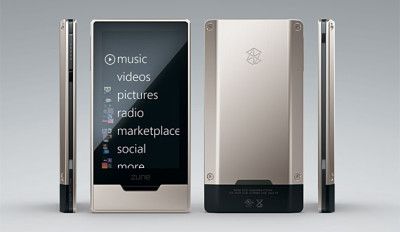From our front-page news:
Success can mean many things, but where audio players, like the iPod, Sansa, Zune and others are concerned, it's hard to call something a success when Apple manages to sell so many players, the results would skew a graph if you threw all the numbers in there. Microsoft, for some reason, doesn't seem to actually want to enjoy success with their Zune, and that confuses me.
I have never owned a Zune, but I have used one from time to time. When the time came where I wanted to purchase an MP3 player with lots of storage, I chose the iPod Classic 120GB, which I wrote about at the time. I had actually wanted the Zune, but the fact that the Zune Marketplace wasn't available in Canada pretty much killed that idea for me. Although I prefer to buy most of my music in music stores, I still use iTunes fairly frequently to get single tracks, or other albums on the cheap, so given that the iPod 120GB and Zune 120GB cost the same at the time, the decision was a no-brainer.
So here comes along the Zune HD, a player that really looks like it has what it takes to do battle with Apple's iPod. It features a large screen, NVIDIA's fast Tegra processor, and unlike all of the iPods on the market, it actually features a radio tuner - and an HD one at that. So what am I complaining about? Oh, just about the fact that once again, consumers outside of the US are getting the shaft.
Let me get this straight. Apple, who has a worldwide reach with both their iPod line-up and their iTunes music store has been pushing incredible sales numbers for years. Then there's Microsoft, who decides to keep their latest creation, which actually looks pretty damn cool, within the US, along with their Zune Marketplace. I'm no business major, but how exactly does this make sense?

"For the time being the Zune HD device will remain US only," a Microsoft spokesperson told Ars. "Right now we are focused on deploying an exciting service in the form of Zune Video to 18 markets. We are looking at potential future hardware experiences for these markets, but do not have anything to announce right now." That's the official word, despite reports from April 2009 indicating that this year's Zune platfrom update would be an international one.
Source: Ars Technica
I have never owned a Zune, but I have used one from time to time. When the time came where I wanted to purchase an MP3 player with lots of storage, I chose the iPod Classic 120GB, which I wrote about at the time. I had actually wanted the Zune, but the fact that the Zune Marketplace wasn't available in Canada pretty much killed that idea for me. Although I prefer to buy most of my music in music stores, I still use iTunes fairly frequently to get single tracks, or other albums on the cheap, so given that the iPod 120GB and Zune 120GB cost the same at the time, the decision was a no-brainer.
So here comes along the Zune HD, a player that really looks like it has what it takes to do battle with Apple's iPod. It features a large screen, NVIDIA's fast Tegra processor, and unlike all of the iPods on the market, it actually features a radio tuner - and an HD one at that. So what am I complaining about? Oh, just about the fact that once again, consumers outside of the US are getting the shaft.
Let me get this straight. Apple, who has a worldwide reach with both their iPod line-up and their iTunes music store has been pushing incredible sales numbers for years. Then there's Microsoft, who decides to keep their latest creation, which actually looks pretty damn cool, within the US, along with their Zune Marketplace. I'm no business major, but how exactly does this make sense?

"For the time being the Zune HD device will remain US only," a Microsoft spokesperson told Ars. "Right now we are focused on deploying an exciting service in the form of Zune Video to 18 markets. We are looking at potential future hardware experiences for these markets, but do not have anything to announce right now." That's the official word, despite reports from April 2009 indicating that this year's Zune platfrom update would be an international one.
Source: Ars Technica
